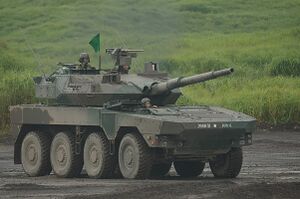AMV40 Hornisse: Difference between revisions
| Line 57: | Line 57: | ||
===Armament=== | ===Armament=== | ||
The main armament is an Askvig made 120mm/44 caliber gyro-stablized high pressure, low recoil gun outfitted with a thermal sleeve and an upgraded {{wp|bore evacuator}} which was designed to improve the system's lifespan and increase reliabilty while in combat. The turret, crewed by the commander and gunner, can hold up to 18 rounds in ready positions while the remaining 30 are stored lower in the hull near the loader station. The Hornisse is equipped with a [[Steiger Defense GmbH]] Artemis fire control system which gathers data from numerous sensors located at numerous points across the vehicle. Firing solution data is determined by the system through multiple data points such as the distance to target determined by the laser rangefind, the type of ammunition loaded, windspeed, temperature outside of the vehicle, lead angle, | The main armament is an Askvig made 120mm/44 caliber gyro-stablized high pressure, low recoil gun outfitted with a thermal sleeve and an upgraded {{wp|bore evacuator}} which was designed to improve the system's lifespan and increase reliabilty while in combat. The turret, crewed by the commander and gunner, can hold up to 18 rounds in ready positions while the remaining 30 are stored lower in the hull near the loader station. The Hornisse is equipped with a [[Steiger Defense GmbH]] Artemis fire control system which gathers data from numerous sensors located at numerous points across the vehicle. Firing solution data is determined by the system through the collation of multiple data points such as the distance to target determined by the laser rangefind, the type of ammunition loaded, windspeed, temperature outside of the vehicle, lead angle, and barrell integrity. The [[Steiger Defense GmbH|Steiger Basilisk Combat Optic]] suite, which feeds into the onboard crew terminals, is fitted with high definiton thermal and night vision cameras which provide a continious panormic view of the vehicle during operation. These systems all work in unison to provide the crew with as much information as possible during combat, regardless of the time of day, while the vehicle is either stationary or mobile. | ||
===Protection=== | ===Protection=== | ||
Revision as of 01:47, 3 April 2021
| AMV40 Hornisse | |
|---|---|
 | |
| Type | Armoured fighting vehicle |
| Place of origin | |
| Service history | |
| Used by | |
| Wars | Arzell Crisis |
| Production history | |
| Designer | Askvig Defense Services AG |
| Designed | 2009 - 2020 |
| Manufacturer | Concordia Vehicle Assembly Plant |
| Unit cost | $1.89 million ISD |
| Produced | 2020 - Present |
| Specifications | |
| Weight | 28 tonnes |
| Length | 9.23 m (30 ft 3 in) |
| Width | 2.98 m (9 ft 9 in) |
| Height | 2.9 m (9 ft 5 in) |
| Crew | 4 |
Main armament | 120mm L44 Rifled Gun |
Secondary armament | 12.7mm AA Gun 7.62×51mm coaxial machine gun |
| Engine | 10-cylinder water-cooled diesel (573 hp) |
| Suspension | Wheeled 8 x 8 |
Operational range | 804 km (500 mi) |
| Speed | 120 km/h (75 mph) |
Overview
Armament
The main armament is an Askvig made 120mm/44 caliber gyro-stablized high pressure, low recoil gun outfitted with a thermal sleeve and an upgraded bore evacuator which was designed to improve the system's lifespan and increase reliabilty while in combat. The turret, crewed by the commander and gunner, can hold up to 18 rounds in ready positions while the remaining 30 are stored lower in the hull near the loader station. The Hornisse is equipped with a Steiger Defense GmbH Artemis fire control system which gathers data from numerous sensors located at numerous points across the vehicle. Firing solution data is determined by the system through the collation of multiple data points such as the distance to target determined by the laser rangefind, the type of ammunition loaded, windspeed, temperature outside of the vehicle, lead angle, and barrell integrity. The Steiger Basilisk Combat Optic suite, which feeds into the onboard crew terminals, is fitted with high definiton thermal and night vision cameras which provide a continious panormic view of the vehicle during operation. These systems all work in unison to provide the crew with as much information as possible during combat, regardless of the time of day, while the vehicle is either stationary or mobile.